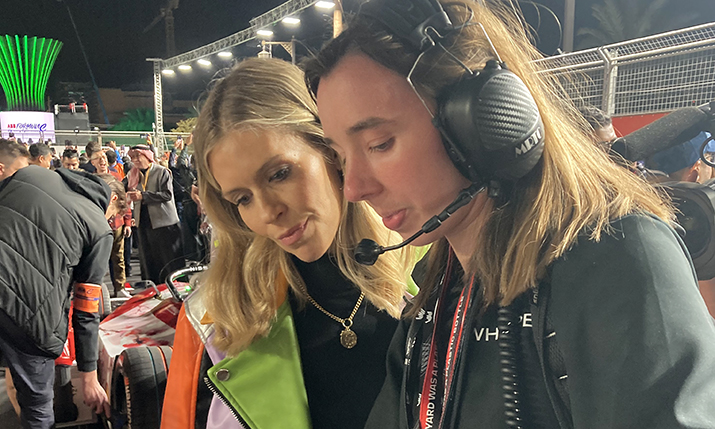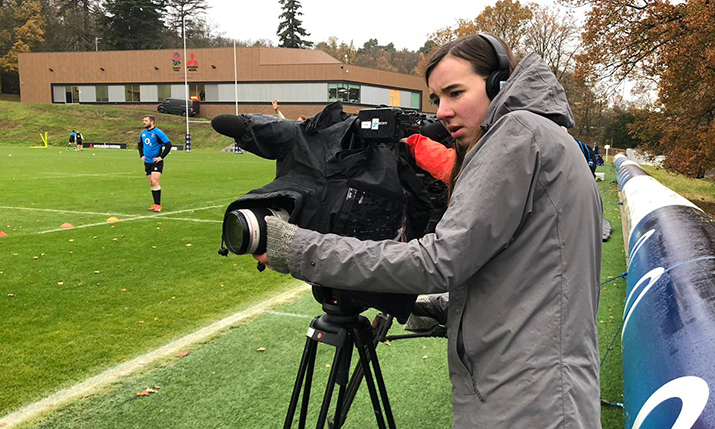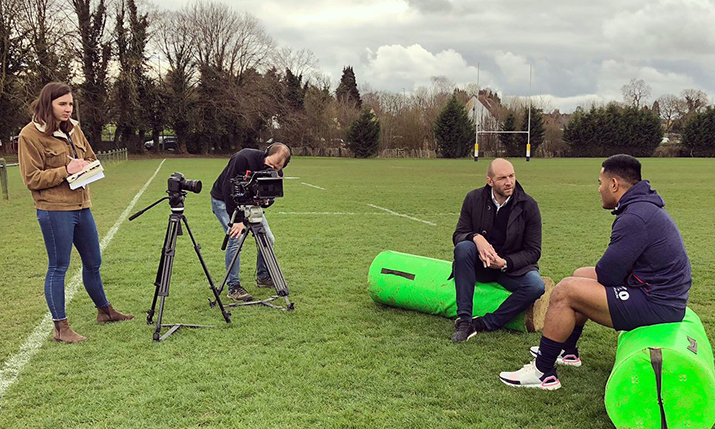Stepping Stones: Whisper assistant producer Esme Simcox talks passion for all things motorsport

Esme Simcox works as an assistant producer for Whisper on Channel 4’s Formula 1 highlights show
Esme Simcox is an assistant producer at the production company Whisper. She is passionate about sport and her career has taken her deep into the world of motorsport with Formula 1 and Formula E. Her article is part of our Stepping Stones series which aims to bring women at the beginning of their careers in sports broadcasting into the spotlight.
What is your job role today and what do you enjoy about it?
I’m currently an assistant producer at Whisper, working on the Formula 1 highlights for Channel 4. However, recently I have also been part of the Formula E team working on the coverage of the English language broadcast. I love many things about my job, but one of the things I enjoy the most is that no two weeks are the same. There is always a new story to tell, a creative opener to come up with or something new to learn, which keeps it interesting.
Since I was a child, I have had a huge passion for sport, mainly due to its unpredictable nature, which is always exciting. Therefore, working in a genre which I have passion for gives my job enjoyment. Finally, I love the team that I work with. They are always supportive and a great group of people to be around. They make the 2am call times bearable.
What does your current job entail on a day-to-day basis?
I don’t tend to have a day-to-day standard routine. However, I can give you some examples of what I might do in any given week. I might be asked to come up with ideas for the weekend’s openers or think about which F1 driver would be good to interview for a feature. I need to make sure that I’m coming up with ideas that are telling the current season’s story in a creative, interesting and entertaining way. Once our team has chosen an idea, I will start the prep work. This might involve writing a script, finding the best shots available from our video archive, selecting a suitable music track (that is also clearable), thinking about ideas for graphics or researching and writing topics ideas or questions for the interview.
Working with an editor is something I do every race week; this involves being alongside the editor to help put together the opener or feature ahead of our show. As a part of this, I need to communicate to the editor what the piece or idea is about when it comes to an opener, or when it’s an interview ensuring that we have told the right story. Sometimes, I will rough cut the interview before handing it over to an editor to help be efficient with their time or to show my producer what I’m thinking to include.
I might be asked to produce a piece. This involves finding a film crew and discussing with them which kit to bring. In addition, I might need to find a location, write a shot list, find a talent member to front the piece and produce a filming schedule, to ensure we get all the shots we need to put it together. On a race weekend I will either be put into the stich edit or the race/qualifying highlights edit, both roles have different responsibilities. For the stich I will working alongside the producer to put the show together. As we are a highlight show we film different sections of our shows at different times. When it comes to the stitch I will be following the running order that my producer has put together to make sure all the right parts are in the correct place and adding any additional things that it might need such as graphics.
My role in the race/qualifying highlights edit is to watch and listen to our commentary team on the world feed and select the part that will go into the highlights. As a part of this I have to make sure that I’m putting in the correct moments in order for the viewer to understand the story of the race or the qualifying session. This can sometimes be very tricky especially when there is a lot of action on the track.

Whisper assistant producer Esme Simcox filming at the RFU’s Centre for Athletic Development
Can you talk us through your relevant education that helped you break into the sports broadcasting industry?
I knew from a young age that I wanted to work in the TV broadcast industry, so I studied drama at GCSE and Media Production at college. This enabled me to do a degree in Digital Television Production at Ravensbourne University. My degree gave me the experience to try out a variety of roles and the basic knowledge on different genres of television that I go into in the future.
How did you get your first job in sports broadcasting, what was the role, and when?
I got my first job while I was in my final year of university. I was a runner for BT Sport on WTA Tennis, back in 2018. I got this job through an interview that I did for my university dissertation. After the completion of my dissertation, I made sure to follow up with all the interviewees to see if there was any opportunities for work experience, as I was keen to learn more about the sport broadcast industry. One of them mentioned that they were looking for runners on the Women’s Tennis which I was thrilled about.
What happened next to get you where you are today?
Following my runners job at the WTA, I secured a research position at the BT Sport Rugby department. I progressed to an assistant producer working on the Premiership Rugby, The Premiership Rugby Cup, the European Champions Cup and Challenge Cup, which I very much enjoyed.
After three and a half years, I decided that I wanted to further my career and try challenge myself with a different sport. After watching ‘Drive to Survive’ on Netflix, I started to watch the Formula 1 coverage on Channel 4 and became a huge fan of the sport. I then noticed a job listing on LinkedIn for an assistant producer for Whisper, covering Channel 4’s Formula 1 and applied for the job, which is where I am today.
I have now been working at Whisper for nearly two years and it was one of the best decisions I have made. As well as working on Formula 1, I have been given the opportunity to work in a range of different TV genres and on various projects including documentaries, branded work for clients, the Neom Beach Games, NFL End Zone and now Formula E.
What are your career goals?
In five to 10 years, I would love to be a sports producer for Formula 1, but I’m open to other sports too. The prospect of producing a show where I have put the structure of the programme together, is very exciting.
I have a few career goals that I would love to achieve, including producing an opener or feature for the Paralympics or Olympics. Similarly, I would love to work on a World Cup or Wimbledon. I have always had a passion for Women in Sport and would also love to have the opportunity to help boost their coverage.

Whisper assistant producer Esme Simcox has also worked on coverage of club rugby
Can you give us some top tips that really helped you get where you are today?
One of my top tips is to take every opportunity that comes your way, as you never know what you might learn or what it could lead to. I have learnt many new skills from working on a range of different projects some not even related to sports. I have had the opportunity to work on internet festivals as a production assistant, to a runner at the Edinburgh TV festival to filming and editing a video for a rugby charity.
Also, I would keep a list of all the different people you meet in the industry, making a note of where you have met them, what you worked with them on and their role, e.g. camera operator, editor or producer. You never know when a contact might come in handy in the future and by writing down some details, you can add a personal touch when contacting them again.
Can you give us some tips on things not to do or to avoid when trying to get a role you really want?
One of my key tips is not to lie in an interview about your skills, capabilities and knowledge, even if you are very keen on the role. It’s better and simpler to be completely honest. When I was applying for the Formula 1 job, for example, I was honest with them about my level of knowledge about the sport. I mentioned that my understanding of Formula 1 mainly came from through watching Drive to Survive, rather than pretending to be someone who has watched it for years and years.
What would you say are the barriers to getting a job in the broadcast industry?
One barrier to getting a job in the broadcast industry is knowing where and how to start looking for jobs you are interested in. Since getting into the industry, I have discovered that there are lots of networking events you can attend, where you can meet people from the industry and find out about work experience and job opportunities.
Some people feel that being a female is a barrier, which can sometimes be the case, especially when it comes to roles that are linked to producing, particularly when the role covers a male-dominated sport. However, our industry is rapidly changing and equal opportunities are improving. The Formula 1 team was predominantly female last season, both on and off-screen.
What would you recommend to other people thinking of working in the broadcast industry?
I would recommend that you go for it. The broadcast industry is a lot of fun, you get to work with a bunch of people that are very talented and creative and no day is the same. All you need is passion, a drive and to be able to think outside the box.

